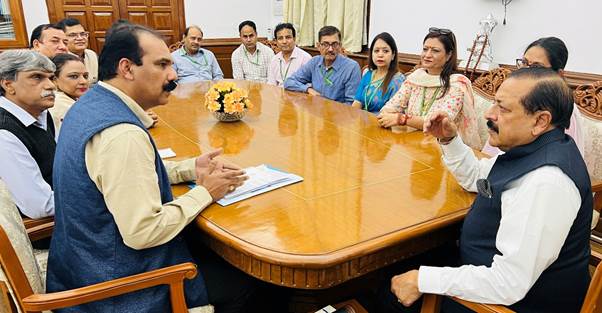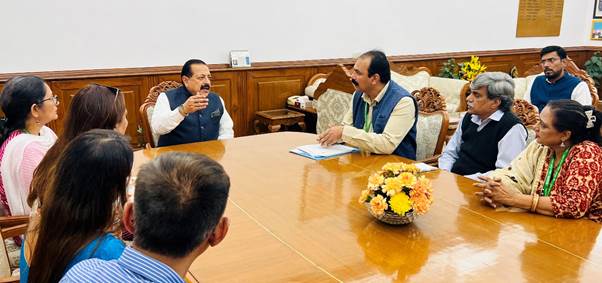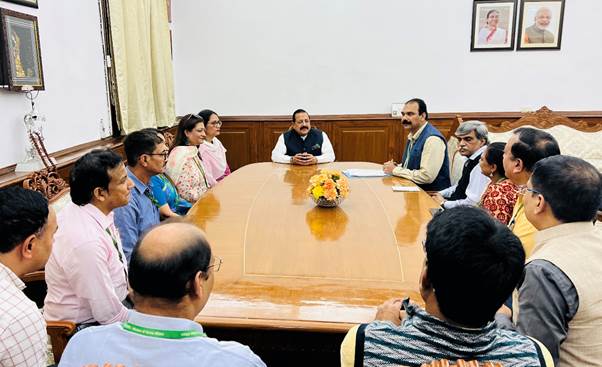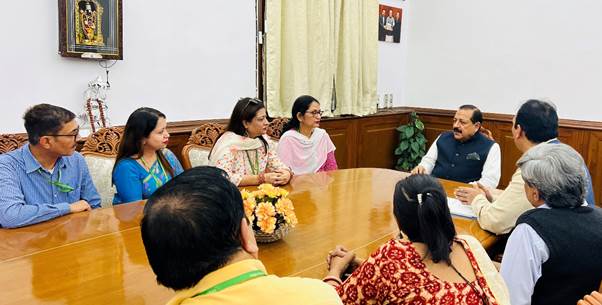Central Secretariat Rajbhasha Seva Sangathan delegation calls on Dr Jitendra Singh, thanks DoPT Minister for clearing of the backlog of delayed promotion cases by ordering mass promotions, request for similar disposal of remaining cases pertaining to Rajbhasha officials
Union Minister of State (Independent Charge) Science & Technology; MoS PMO, Personnel, Public Grievances, Pensions, Atomic Energy and Space, Dr Jitendra Singh has said that the DoPT (Department of Personnel & Training) is keen to ensure timely promotions without the slightest delay.
The Minister was speaking to a Central Secretariat Rajbhasha Seva Sangathan delegation that called on him in New Delhi. The members of the delegation thanked him for clearing of the backlog of delayed promotion cases by ordering mass promotions and requested for similar disposal of remaining cases pertaining to Rajbhasha officials.

Assuring that the DoPT, Ministry of Personnel is equally concerned about the timely promotions of Government employees in various cadres, Dr Jitendra Singh said, earlier this year in the month of June, the DoPT had approved the mass promotion of 1,592 officials working in the capacity of ASOs to the post of SOs on ad hoc basis with immediate effect.
The Promotions had been expedited on the directions of the Minister Incharge DoPT, Dr Jitendra Singh who personally reviewed the entire process.
The Minister said, last year alone about 9,000 mass promotions were made and prior to that the DoPT granted 4,000 promotions in the preceding three years.

Expressing their gratitude to Dr Jitendra Singh for his personal intervention in approving mass promotions, the members of the delegation requested the Minister Incharge DoPT to review the promotion policy in their Cadre as the promotion prospects are less, affecting the morale of the employees.
Dr Jitendra Singh said, Prime Minister Shri Narendra Modi is very keen that hardworking and performing officials should be provided with a work-friendly environment and at the same time, be provided with timely Service benefits so that they remain motivated to give in their best for nation-building.

The Minister said that in the last over nine years, under the guidance of PM Modi, the Government has periodically reviewed the longstanding stagnation issues in the various Central Ministries, that are a legacy of the past due to pending court cases, lack of vacancies in higher grades and other personnel issues.
Dr Jitendra Singh said, the Government is concerned about long stagnation in certain cadres and at certain levels where some of the employees working in the lowest rung of the administration spend their entire service tenure of 30 to 35 years without getting a single promotion. The DoPT Minister said he has discussed the issue with all the senior officers in the Department and several innovative steps have been initiated to avoid stagnation at middle and lower rungs of the administration.
Dr Jitendra Singh regretted that in a large number of cases, stagnation in promotions was the result of litigations prompted by inappropriate decisions taken or rules twisted to give out-of-turn promotions by the previous governments.
In a few of the 4,000 promotions cleared in recent years, the Government granted promotions despite the cases being sub-judice, by consulting legal experts and making valid provisions for judicial scrutiny, said the Minister.
The orders for mass promotion of these employees belonging to the CSS cadre were issued after several rounds of high-level meetings in DoPT chaired by Dr Jitendra Singh in the preceding months.

Dr Jitendra Singh said, in order to bring in the Ease of Governance as well as objectivity in empanelment, the government has, in the last nine years, improvised upon the procedures so as to ensure that there are no subjective preferences involved in carrying out the promotions.
“Procedures have been made more hi-tech using sophisticated technology tools to minimize the human interface,” he added.
The DoPT Minister said, as part of administrative reforms, the Government has done away with over 1,600 rules which were either obsolete or had become irrelevant with the passage of time.
“All this is meant not only to ensure effective and timely delivery of outcomes for the public, but also to enable the employees to perform to the best of their ability,” he said.

